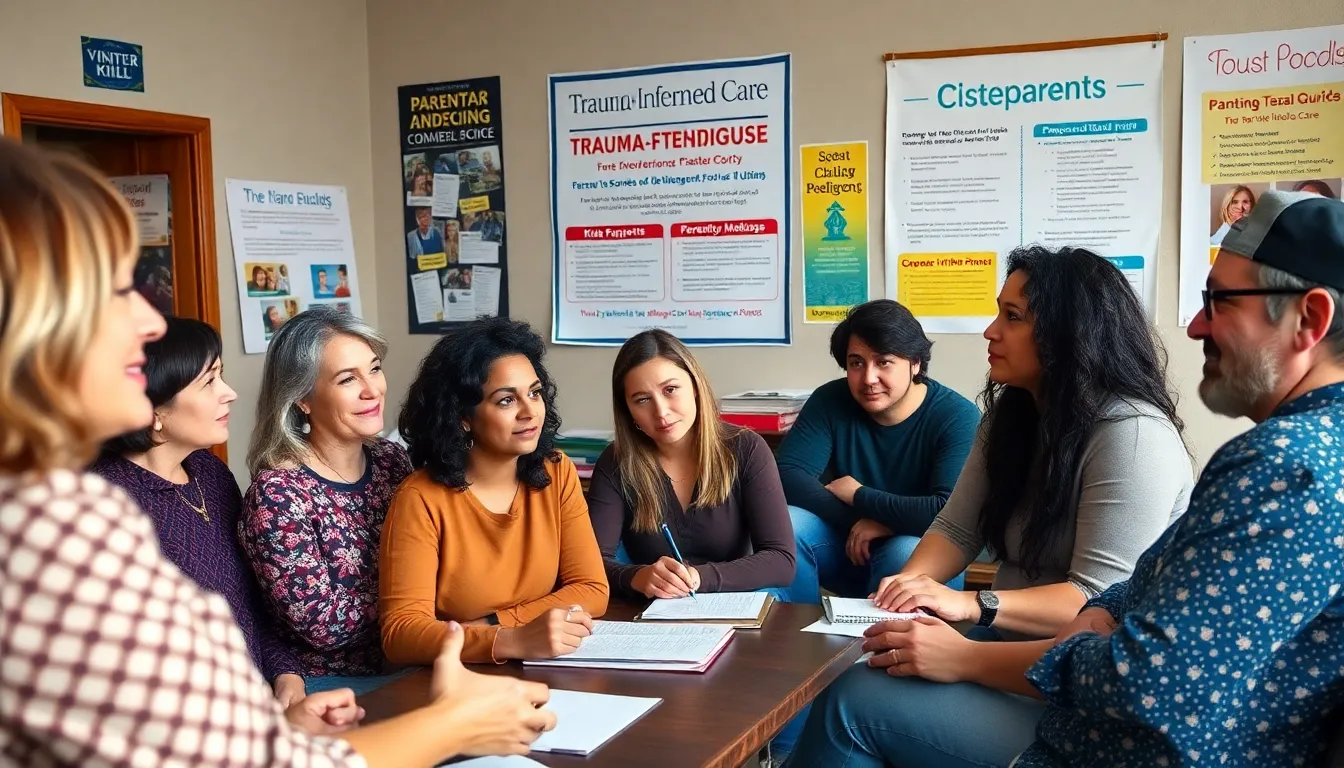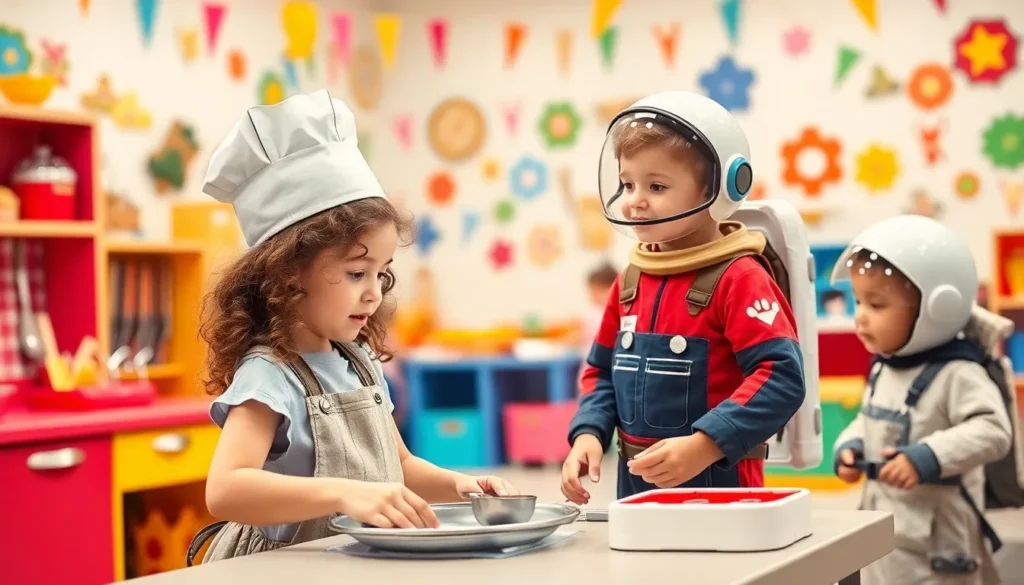Table of Contents
ToggleFoster parenting can feel like navigating a rollercoaster blindfolded—exciting but a bit terrifying. That’s where foster parenting workshops come in, acting as the trusty safety harness that keeps everything in place. These workshops aren’t just about paperwork and policies; they’re a treasure trove of practical tips, emotional support, and a community that understands the unique challenges foster parents face.
Overview of Foster Parenting Workshops
Foster parenting workshops play a crucial role in preparing individuals for their unique responsibilities. These sessions address emotional, practical, and community aspects of foster parenting, enhancing the overall experience.
Importance of Training for Foster Parents
Training equips foster parents with essential knowledge and skills. They learn effective communication strategies to connect with children. Understanding trauma-informed care helps foster parents support children with past experiences. Workshops also provide insights into behavioral management and conflict resolution. Building confidence through education fosters resilience and adaptability in challenging situations.
Types of Workshops Available
Various types of workshops cater to the needs of foster parents. Orientation sessions introduce new parents to the foster care system. Ongoing training workshops focus on specific topics like child development and attachment. Support groups facilitate peer exchanges about shared experiences. Specialized training addresses unique needs related to medical, behavioral, or cultural backgrounds. Each workshop type plays a vital role in developing well-rounded, informed foster parents.
Key Topics Covered in Workshops

Workshops for foster parenting cover a variety of essential topics aimed at building effective parenting skills and providing emotional support. Participants gain valuable insights and techniques to foster a stable and nurturing environment.
Parenting Techniques and Tools
Workshops emphasize practical parenting techniques and tools. Effective communication strategies are often highlighted to improve relationships between foster parents and children. Parenting styles that promote emotional support help create a secure atmosphere. Techniques on setting appropriate boundaries teach parents how to navigate tricky situations. Supportive resources like behavior management strategies assist in addressing various challenges. Role-playing scenarios provide hands-on experience in applying these techniques, enhancing confidence among foster parents.
Trauma-Informed Care
Understanding trauma’s impact is crucial as workshops focus on trauma-informed care. Participants learn about the effects of trauma on children’s behavior and development, which is key to addressing their needs effectively. Strategies for recognizing signs of trauma prepare parents to respond with empathy and support. The importance of creating a safe environment to facilitate healing and trust is emphasized. Workshops provide information on coping mechanisms that help children process their experiences. Knowledge of community resources ensures that foster parents can access necessary support for themselves and their children.
Benefits of Attending Foster Parenting Workshops
Foster parenting workshops provide numerous advantages that enhance the overall experience for caregivers. They empower individuals with practical tools and emotional resources essential for effective parenting.
Improved Parenting Skills
Foster parenting workshops develop essential skills needed for everyday situations. Participants learn effective communication techniques that promote positive interactions with children. Workshops also cover boundary-setting strategies to establish healthy relationships. Additionally, they offer behavior management resources to handle challenging situations calmly. Practicing through role-playing scenarios boosts confidence, enabling foster parents to respond effectively under pressure. Training participants gain insights into trauma-informed care, increasing understanding of child behaviors linked to past experiences. Knowledge fosters an environment conducive to healing, benefitting both caregivers and children.
Enhanced Support Network
Workshops create valuable connections among foster parents, forming a vital support network. Engaging with peers fosters sharing of experiences, making challenges feel less isolating. Building relationships with other caregivers allows for exchanging parenting tips and resources, enhancing day-to-day management of children in care. Support groups provide emotional encouragement, helping parents process complex feelings that arise during fostering. Regular participation strengthens bonds within the community, offering a sense of belonging and purpose. Networking also links parents to local community resources, ensuring they can access help when needed.
Personal Experiences and Testimonials
Foster parenting workshops create lasting impact through shared experiences. Participants often share their transformative journeys, highlighting the workshops’ significance in fostering resilience and skill development.
Success Stories from Foster Parents
Many foster parents report gratitude for the skills gained during workshops. They recount improved communication that fosters stronger bonds with children. Some share stories about implementing strategies learned in training, which led to positive changes in behavior and trust. One parent described how applying trauma-informed care principles transformed their approach, allowing their child to feel safe and understood. Support networks formed through these workshops further enrich the experience, enabling parents to celebrate milestones together. Each success reinforces the importance of ongoing learning and connection among caregivers.
Challenges and Lessons Learned
Foster parenting presents unique challenges that workshops help address. Participants commonly face emotional hurdles, including feelings of isolation or frustration. One parent described navigating a particularly tough transition period, realizing the crucial role of peer support during this time. Workshops provide tools for self-care, enabling parents to manage stress effectively. Learning to set realistic expectations proves vital, as it shapes responses to difficult situations. Insights from experienced foster parents often illuminate common pitfalls, guiding newcomers through initial challenges. Each lesson learned contributes to a deeper understanding of the foster parenting journey.
Foster parenting workshops play a vital role in shaping confident and capable caregivers. By providing essential skills and emotional support, these workshops empower parents to navigate the complexities of fostering. The connections formed within these sessions create a community that fosters resilience and shared experiences.
As foster parents engage in ongoing learning, they build a toolkit of strategies that enhance their parenting effectiveness. The insights gained not only improve communication and behavior management but also foster a deeper understanding of the emotional landscape children face. This journey is one of growth and connection, where every workshop attended enriches the foster parenting experience.










